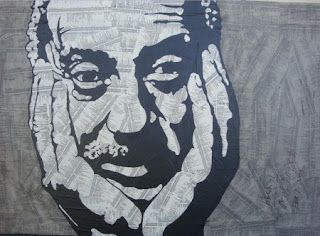Contemporary Ethiopian musicians reinvigorate traditional
jazz stylings for new audiences in America and Addis Ababa.
In the 1960s, as the tastes of American jazz fans shifted
from bebop to avant-garde, Ethiopian musicians were establishing a tradition
whose compositions are just reaching American ears. Why did it take so long for
this riveting, emotionally charged music to arrive?
Ethiopian musicians like Astatke, singer Alemayehu Eshete,
and guitarist and arranger Girma Beyene have devoted their lives to blending
Ethiopia's traditional five tones per octave, or pentatonic scale, with Western
chords. Listening to the music they have produced shows the variety of
influences on their approach to jazz.
Astatke traveled to London, Boston and New York in the
1960s, where he heard African-American and Latin jazz to which he added
pentatonic scales. This spawned "Ethio Jazz."
 Eshete and Beyene created a subgenre called swinging Addis
by combining the songs they learned from the Ethiopian Police Band and the
Haile Selassie I Theatre Orchestra with the rhythms they heard on the records
of Sam Cooke, Nat King Cole and James Brown, brought to Ethiopia by Peace Corps
volunteers. As Ethiopian musicologist Simeneh Betreyohannes says, "Most
Ethiopian jazz artists did not go abroad; music was their way of
traveling."
Eshete and Beyene created a subgenre called swinging Addis
by combining the songs they learned from the Ethiopian Police Band and the
Haile Selassie I Theatre Orchestra with the rhythms they heard on the records
of Sam Cooke, Nat King Cole and James Brown, brought to Ethiopia by Peace Corps
volunteers. As Ethiopian musicologist Simeneh Betreyohannes says, "Most
Ethiopian jazz artists did not go abroad; music was their way of
traveling."
The result is music that is primeval and present-day. French
musical curator Francis Falceto was so entranced by the music's rawness and
funky, haunting virtuosity that he has spent 30 years collecting it. The result
is a monumental 23-volume series, much of it available on YouTube, called
Éthiopiques.
American filmmaker Jim Jarmusch also became infatuated with
this particular jazz fusion and used Astatke's albums to score his 2005 movie
about loss and redemption, Broken Flowers. Recently, U.S. audiences could hear
Astatke's energetic horns and mellow vibraphone sampled in Nas and Damian
Marley's lead single, "As We Enter," which debuted on their album,
Distant Relatives.
Politics and geography contributed to the music's late U.S.
arrival. In the 1950s and 1960s, jazz was considered an American art form,
except among Latin jazz fans. Much of the history of jazz in Africa focuses on
musicians like Duke Ellington, Louis Armstrong and Oliver Nelson, who toured
the continent for the U.S. State Department, rather than on Africans creating a
parallel jazz movement.
 Another reason specific to Ethiopia was the 1974 overthrow
of Emperor Haile Selassie by a communist military junta. Until that group was
ousted in 1991, Ethiopia's popular music was censored, nightclubs were
shuttered and only patriotic songs could be recorded. A generation grew up with
scant memory of folk music, the root of Ethiopian jazz.
Another reason specific to Ethiopia was the 1974 overthrow
of Emperor Haile Selassie by a communist military junta. Until that group was
ousted in 1991, Ethiopia's popular music was censored, nightclubs were
shuttered and only patriotic songs could be recorded. A generation grew up with
scant memory of folk music, the root of Ethiopian jazz.
Today's jazz revival in Ethiopia can be attributed to the
success of the Éthiopiques series and the popularity of the Addis Acoustic
Renaissance Group. Led by guitarist Girum Mezmur, 35, the band performs in
Addis Ababa weekly at the packed Club Alize. The group's mission when it
rearranges Ethiopian songs from the 1950s and 1960s is to invigorate "a
new generation of Ethiopian club goers with melodies of the past."
Members of the band also play traditional instruments like
double bass, accordion and mandolin, as well as the kebero, a type of drum, and
clarinet to make the old new.
The group, a mélange of novelty and tradition, consists of
U.S.-trained Ethiopians, like the smooth double-bass player Henock Temesgen, as
well as musicians from 1950s and 1960s, like the mesmerizing Shaleka Melaku on
accordion and Ayele Mamo on mandolin. Now Ethiopians can relish a musical
tradition that was nearly lost at home, and barely acknowledged in the West.
This music is no passing fancy but a spellbinding style that
deserves the critical attention it now receives in the U.S. and Ethiopia.
Whether you listen to the curated Éthiopiques or live music in Ethiopian
nightclubs in Addis Ababa, Atlanta, Washington, D.C. or Los Angeles, you'll
hear a transcontinental exchange of melody, history and culture, and discover
one of jazz's greatest innovations.
Want more? Watch and listen to a range of music and a
playlist of Ethiopian music videos, and check out the Roha Band's modern
approach.
http://www.theroot.com
http://www.theroot.com

No comments:
Post a Comment